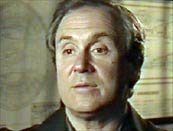 |
 |
How Star Trek affected the world's perception of space
 One thing that we were told, when we first got involved with Star Trek is that the American space programme (in fact, I would think any space programmes in the world) were very grateful for Star Trek. It made the idea of space travel something that was exciting to people, and thus helped governments to fund the various space programmes. That's one of the reasons that organisations like NASA and the JPL have always been very helpful to us, not to mention the fact that a lot of the people who work at those organisations are big Star Trek fans.
One thing that we were told, when we first got involved with Star Trek is that the American space programme (in fact, I would think any space programmes in the world) were very grateful for Star Trek. It made the idea of space travel something that was exciting to people, and thus helped governments to fund the various space programmes. That's one of the reasons that organisations like NASA and the JPL have always been very helpful to us, not to mention the fact that a lot of the people who work at those organisations are big Star Trek fans.
In 1966, when Roddenberry created the first Star Trek series, there hadn't even been a man landing on the Moon. By the time we got to The Next Generation, moon landings were something that everyone took for granted and there were new elements of exploration, deep space probes and the various space ships that have gone out without our solar system, to Mars and Jupiter and things. I think people have become a lot more sophisticated about space travel. People no longer think that the idea of having, humans travelling in space is an absurd fantasy. We have space stations that have been up for many years, and that seem to be continually filled with people; very rarely do you even hear about launches anymore - people take them for granted.
Here in Los Angeles, we have the interesting benefit that, whenever any of these Space Shuttle landings are scrubbed from Florida because of bad weather, they land about ninety miles north of Los Angeles. Whenever that happens - the last time was only a few weeks ago - we get a huge double sonic boom that comes right over Los Angeles. When it happens - 'Boom, boom,' � buildings shake, and that's the Space Shuttle. It's always fun. When we're on the set and hear those two big blasts - you kind of know when they're coming - to know that you're actually hearing a space ship that's coming to land has always been something that we get a kick out of.
|
 |
 |
